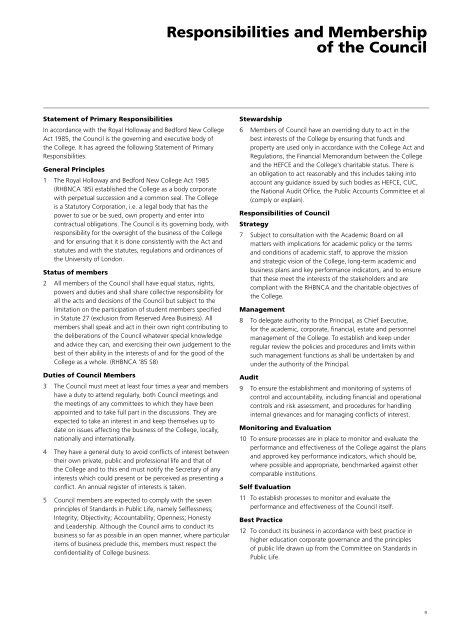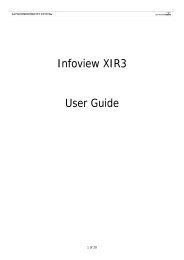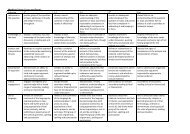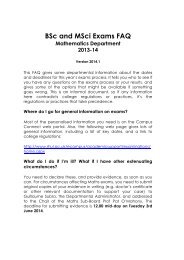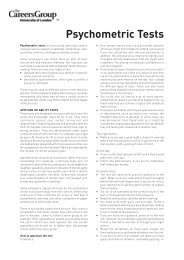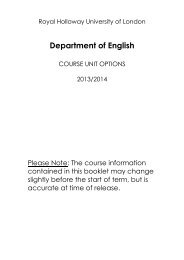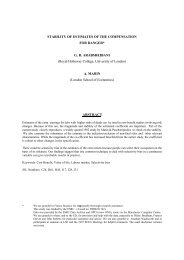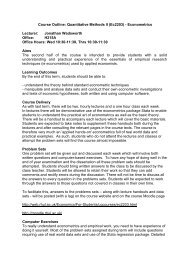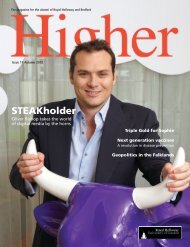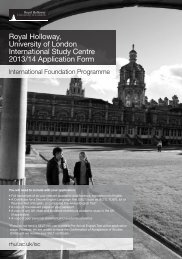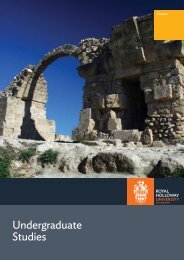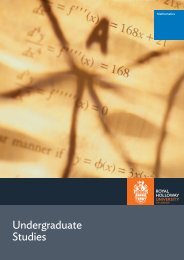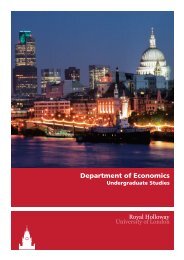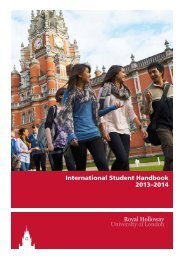Financial Statements 2011 - Royal Holloway, University of London
Financial Statements 2011 - Royal Holloway, University of London
Financial Statements 2011 - Royal Holloway, University of London
You also want an ePaper? Increase the reach of your titles
YUMPU automatically turns print PDFs into web optimized ePapers that Google loves.
Responsibilities and Membership<strong>of</strong> the CouncilStatement <strong>of</strong> Primary ResponsibilitiesIn accordance with the <strong>Royal</strong> <strong>Holloway</strong> and Bedford New CollegeAct 1985, the Council is the governing and executive body <strong>of</strong>the College. It has agreed the following Statement <strong>of</strong> PrimaryResponsibilities.General Principles1 The <strong>Royal</strong> <strong>Holloway</strong> and Bedford New College Act 1985(RHBNCA ’85) established the College as a body corporatewith perpetual succession and a common seal. The Collegeis a Statutory Corporation, i.e. a legal body that has thepower to sue or be sued, own property and enter intocontractual obligations. The Council is its governing body, withresponsibility for the oversight <strong>of</strong> the business <strong>of</strong> the Collegeand for ensuring that it is done consistently with the Act andstatutes and with the statutes, regulations and ordinances <strong>of</strong>the <strong>University</strong> <strong>of</strong> <strong>London</strong>.Status <strong>of</strong> members2 All members <strong>of</strong> the Council shall have equal status, rights,powers and duties and shall share collective responsibility forall the acts and decisions <strong>of</strong> the Council but subject to thelimitation on the participation <strong>of</strong> student members specifiedin Statute 27 (exclusion from Reserved Area Business). Allmembers shall speak and act in their own right contributing tothe deliberations <strong>of</strong> the Council whatever special knowledgeand advice they can, and exercising their own judgement to thebest <strong>of</strong> their ability in the interests <strong>of</strong> and for the good <strong>of</strong> theCollege as a whole. (RHBNCA ’85 S8)Duties <strong>of</strong> Council Members3 The Council must meet at least four times a year and membershave a duty to attend regularly, both Council meetings andthe meetings <strong>of</strong> any committees to which they have beenappointed and to take full part in the discussions. They areexpected to take an interest in and keep themselves up todate on issues affecting the business <strong>of</strong> the College, locally,nationally and internationally.4 They have a general duty to avoid conflicts <strong>of</strong> interest betweentheir own private, public and pr<strong>of</strong>essional life and that <strong>of</strong>the College and to this end must notify the Secretary <strong>of</strong> anyinterests which could present or be perceived as presenting aconflict. An annual register <strong>of</strong> interests is taken.5 Council members are expected to comply with the sevenprinciples <strong>of</strong> Standards in Public Life, namely Selflessness;Integrity; Objectivity; Accountability; Openness; Honestyand Leadership. Although the Council aims to conduct itsbusiness so far as possible in an open manner, where particularitems <strong>of</strong> business preclude this, members must respect theconfidentiality <strong>of</strong> College business.Stewardship6 Members <strong>of</strong> Council have an overriding duty to act in thebest interests <strong>of</strong> the College by ensuring that funds andproperty are used only in accordance with the College Act andRegulations, the <strong>Financial</strong> Memorandum between the Collegeand the HEFCE and the College’s charitable status. There isan obligation to act reasonably and this includes taking intoaccount any guidance issued by such bodies as HEFCE, CUC,the National Audit Office, the Public Accounts Committee et al(comply or explain).Responsibilities <strong>of</strong> CouncilStrategy7 Subject to consultation with the Academic Board on allmatters with implications for academic policy or the termsand conditions <strong>of</strong> academic staff, to approve the missionand strategic vision <strong>of</strong> the College, long-term academic andbusiness plans and key performance indicators, and to ensurethat these meet the interests <strong>of</strong> the stakeholders and arecompliant with the RHBNCA and the charitable objectives <strong>of</strong>the College.Management8 To delegate authority to the Principal, as Chief Executive,for the academic, corporate, financial, estate and personnelmanagement <strong>of</strong> the College. To establish and keep underregular review the policies and procedures and limits withinsuch management functions as shall be undertaken by andunder the authority <strong>of</strong> the Principal.Audit9 To ensure the establishment and monitoring <strong>of</strong> systems <strong>of</strong>control and accountability, including financial and operationalcontrols and risk assessment, and procedures for handlinginternal grievances and for managing conflicts <strong>of</strong> interest.Monitoring and Evaluation10 To ensure processes are in place to monitor and evaluate theperformance and effectiveness <strong>of</strong> the College against the plansand approved key performance indicators, which should be,where possible and appropriate, benchmarked against othercomparable institutions.Self Evaluation11 To establish processes to monitor and evaluate theperformance and effectiveness <strong>of</strong> the Council itself.Best Practice12 To conduct its business in accordance with best practice inhigher education corporate governance and the principles<strong>of</strong> public life drawn up from the Committee on Standards inPublic Life.9


